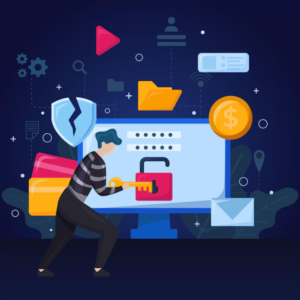In today’s digitally driven world, where more personal and business data is stored online, cybersecurity has become a critical issue. The rise in cyberattacks—from data breaches to phishing scams and ransomware—means that individuals and businesses must take proactive measures to safeguard their sensitive data. Understanding the modern cybersecurity challenges and implementing tools like encryption, firewalls, and antivirus software is crucial to keeping your information safe.
The Rise of Cyberattacks in 2024
Cybercriminals are becoming more sophisticated in their methods, leveraging advanced technology to exploit vulnerabilities in both individuals and organizations. Cyberattacks are not limited to large corporations; small businesses and individuals are just as likely to be targeted. From stealing personal data to holding businesses ransom, the impact of these attacks can be devastating.
Here are a few key trends driving the increase in cyberattacks:
-
Remote Work Vulnerabilities:
With the rise of remote work, more employees are accessing company data from unsecured home networks, increasing the risk of data breaches.
-
Increased Cloud Usage:
As businesses migrate to the cloud for storage and applications, the potential attack surface grows, with hackers targeting misconfigured cloud environments.
-
IoT Device Weaknesses:
The rapid adoption of Internet of Things (IoT) devices has introduced new vulnerabilities as these devices are often less secure, providing easy entry points for cybercriminals.

Modern Cybersecurity Challenges
As cybersecurity threats evolve, the challenge lies in staying ahead of these ever-changing tactics. Hackers are increasingly using artificial intelligence (AI) and machine learning (ML) to automate attacks, making it harder for traditional security tools to keep up. Some of the most common cybersecurity challenges faced today include:
-
Phishing Attacks: Cybercriminals send fake emails that appear to be from trusted sources, tricking individuals into providing sensitive information like passwords or credit card numbers.
-
Ransomware: Attackers encrypt a company’s data and demand a ransom to restore access. Ransomware attacks have increased dramatically in recent years, affecting companies and even critical infrastructure.
-
Zero-Day Exploits: Hackers target previously unknown vulnerabilities in software before developers have a chance to fix them, making these attacks particularly dangerous.
Protecting Your Data: Key Cybersecurity Tools
While the cybersecurity landscape is becoming more complex, several proven tools can help individuals and organizations protect their data online. Here’s how you can safeguard your sensitive information:
-
Encryption: The Power of Data Scrambling
Encryption is a powerful method for protecting data, ensuring that only authorized individuals can access it. When data is encrypted, it’s converted into a code that can only be deciphered with a key or password. This is especially important when transmitting sensitive information over the internet, such as financial transactions or personal details.
-
Types of Encryption:
-
Symmetric Encryption: A single key is used to both encrypt and decrypt the data.
-
Asymmetric Encryption: Two keys are used—one public key for encryption and one private key for decryption, offering greater security.
-
-
Where It’s Used:
-
Email Encryption: Tools like ProtonMail and GPG ensure your email conversations remain private.
-
End-to-End Messaging Apps: Apps like WhatsApp and Signal use encryption to protect your messages from being intercepted by third parties.
-
Encrypted Storage: Services like Google Drive and Dropbox offer encryption to protect stored data.
-
-
Firewalls: The First Line of Defense
A firewall acts as a barrier between your computer and the internet, filtering incoming and outgoing traffic based on security rules. Firewalls monitor data exchanges and block unauthorized access to your network, protecting it from malicious traffic.
-
Types of Firewalls:
-
Network Firewalls: Protect entire networks by filtering traffic between internal and external networks (e.g., your home Wi-Fi and the internet).
-
Host-Based Firewalls: Installed on individual devices to monitor traffic to and from that specific computer.
-
-
Practical Applications:
-
Home Routers: Many modern routers come with built-in firewalls to protect home networks.
-
Business Networks: Corporations use advanced firewalls, often combined with other security tools, to protect large networks from intrusion.
-
-
Antivirus Software: Detecting and Eliminating Threats
Antivirus software is designed to detect, block, and remove malicious software, such as viruses, trojans, and spyware. These tools continuously scan your computer for known malware signatures and suspicious behavior, offering an additional layer of protection against threats.
-
Top Antivirus Tools:
-
Norton Antivirus: Known for its comprehensive protection and real-time threat detection.
-
Bitdefender: Provides advanced malware detection and protection, including phishing and ransomware defenses.
-
Kaspersky: Offers strong virus protection alongside privacy and identity protection features.
-
-
Why You Need Antivirus Software:
-
Real-Time Protection: Antivirus programs constantly monitor your system for threats, stopping them before they can cause harm.
-
Automatic Updates: These programs frequently update their malware definitions to defend against new and emerging threats.
-
Best Practices for Protecting Your Data
Beyond encryption, firewalls, and antivirus software, it’s essential to adopt cybersecurity best practices to minimize your risk of falling victim to cyberattacks. Here are several key steps to keep your data safe:
-
Use Strong, Unique Passwords:
Create complex passwords for each of your accounts, and avoid using the same password across multiple sites. Consider using a password manager like LastPass or 1Password to securely store and manage your passwords.
-
Enable Two-Factor Authentication (2FA):
2FA adds an extra layer of protection by requiring not only a password but also a secondary form of verification, such as a code sent to your phone or an authentication app like Google Authenticator.
-
Be Wary of Phishing Scams:
Be cautious when receiving unsolicited emails or messages that ask for personal information. Look out for red flags, such as misspellings, suspicious links, or requests for sensitive data.
-
Keep Software Updated:
Ensure that your operating system, browser, and software are always up to date. Cybercriminals often exploit vulnerabilities in outdated software, so enable automatic updates when possible.
-
Regularly Backup Your Data:
Store your important files in multiple locations, such as an external hard drive and a cloud storage service, to protect against data loss due to ransomware attacks or hardware failures.
Why Cybersecurity Matters More Than Ever
With cyber threats evolving and becoming more sophisticated, cybersecurity is no longer a luxury—it’s a necessity. For both individuals and businesses, protecting sensitive data is crucial to maintaining privacy, ensuring financial security, and preserving trust.
-
For Businesses:
A single data breach can cost businesses millions of dollars in fines, legal fees, and lost customers. Implementing strong cybersecurity measures can prevent these costly attacks and protect a company’s reputation.
-
For Individuals:
Personal data, including financial information and identity details, is highly valuable to cybercriminals. By adopting good security habits, individuals can reduce the risk of identity theft and financial fraud.




